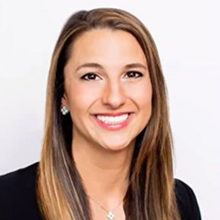A Massachusetts General Hospital orthopedic surgery fellow has become a national leader in the movement to make her field more diverse and welcoming to women. She is striving to improve workplace culture for orthopedic surgery residencies by encouraging open communication and recommending policies and procedures aimed at identifying, addressing, and even preventing inappropriate behaviors.
“In order to provide the best care, we have to be able to relate to our patients. And to do that, our field needs people from all walks of life — all races, creeds and expressions of gender — in order to provide a full range of perspectives and outlooks,” says Arianna Gianakos, DO, a fellow in foot and ankle surgery in the Department of Orthopaedic Surgery. “But orthopedics is still a very male-dominated field, especially in some of the smaller residency programs. And there are still abusive behaviors in the workplace, such as bullying, harassment, sexual harassment and discrimination. We have a lot to improve upon in order to cultivate an educational environment that caters to and welcomes all people.”
Dr. Gianakos has been instrumental in global online conversations about gender-related issues in orthopedics as a founding member of SpeakUp Ortho, which has been growing in popularity on Twitter and Facebook. She’s now expanding that work to include other medical specialties in a “SpeakUp” coalition. For her efforts, Dr. Gianakos was recently awarded the first-ever Ruth Jackson Orthopedic Society Courage Award for her research and work to improve the culture of orthopedic surgery.
Understanding the Culture of Orthopedic Surgery Residency
Research has shown that bullying, harassment, sexual harassment and discrimination in any medical field are associated with poor mental health, low self-esteem, absenteeism and low productivity among both trainees and career professionals. The behaviors can even compromise patient safety by creating a fear of speaking up among the health care team.
Dr. Gianakos experienced abusive behaviors during residency, so she understands the emotions and the consequences involved. “I almost quit orthopedics during my residency. When you are bullied or harassed, you start to question yourself: Am I good enough? Am I supposed to be going into this field? I remember feeling very alone at times and realized that I had to develop confidence in myself in order to overcome the mental anguish brought about by mistreatment. But, instead of saying, ‘I’m going to quit orthopedic surgery and go into something different,’ I asked myself, ‘How can I use my voice and my research knowledge to create a platform?'” she recalls.
Dr. Gianakos began a chief-year research project — a meta-analysis of peer-reviewed literature published in the previous 10 years, examining bullying, harassment, sexual harassment and discrimination in resident education programs, primarily in surgical training, not just orthopedics. She sought to understand how people reported such behaviors, the reasons for not reporting, and the outcomes when someone did report.
The results, recently published in the World Journal of Surgery, found that Dr. Gianakos was not alone in her experiences. “Depending on the behavior, we found that up to 60% of residents experienced abusive behavior during training. 71% of these residents did not report the behavior to their institution due to fears of retaliation, career detriment and a sense that they wouldn’t be believed,” Dr. Gianakos explains. “Furthermore, those who did report said they weren’t happy with the outcomes. They felt like no one was listening.”
Women in Medicine Speak Up
While working on her meta-analysis, Dr. Gianakos had many conversations with other women throughout the country. Two trends stood out: many women reported negative behaviors going back decades, which, when combined with more recent examples like Dr. Gianakos’, suggests that the field’s culture may not have changed much over time; and women were experiencing abusive behaviors across the career continuum, i.e. from medical school through advanced training and even into well-established careers.

Dr. Gianakos and a group of three other women decided to take action. They founded SpeakUp Ortho, a digital campaign that encourages women to share their stories, anonymously if they wish, to raise awareness and promote change. #SpeakUpOrtho almost instantly had thousands of followers on social media.
“Within the first two months, we had over 350 stories from women, detailing sexual harassment, rape, repeat bullying, mental abuse, discrimination and racism,” Dr. Gianakos recalls.
At first, she was an anonymous founder and contributor to SpeakUp Ortho, but she has now outed herself to take on a proactive, public role. “When I finally graduated my residency, I felt more comfortable being a little more open in the group, being more of a leader. But for me, to speak up wasn’t enough. I wanted to do something that would actually change the system, so that others would not have to experience abusive behaviors the way that I and so many others had during training,” she says. “Over time, people started reaching out to me directly, saying, ‘You know, this is happening in other medical specialties, too.'”
She is now working to expand SpeakUp Ortho into a SpeakUp coalition, hosting interdisciplinary meetings to gain insights and support from specialty societies, department chairs, certifying organizations such as the Accreditation Council for Graduate Medical Education, and professionals in other medical specialties, including emergency medicine, plastic surgery, general surgery, vascular surgery, gynecology and internal medicine.
Correcting Culture
The SpeakUp coalition is developing strategies to change the culture in medical training and beyond, including:
- Bystander intervention training built into curricula
- Anonymous reporting systems that are linked with a third-party group
- Training to help people understand bullying and sexual harassment and how to respond
- Codes of conduct and consequences for repeat offenders
- Systems to track repeat behaviors and to differentiate misunderstandings from true behavior problems
- An app stocked with resources for students and residents such as mental health counseling and legal advice
Dr. Gianakos has recently published two articles in the Journal of the American Academy of Orthopedic Surgeons related to these efforts. One is an invited manuscript that contains narratives of women in orthopedic surgery accompanied by commentary from female leaders in the field. The other is a call to action for residency program directors.
“A lot of people fear speaking up because of the power dynamic in medicine. You’re told to keep your head down and keep training, and your life really depends on getting through your residency and your fellowship so that you can get a job,” she says. “One of the most important ways to combat this is to provide a safe place where people can report these abuses of power, free from retaliation.”
Overcoming Adversity to Thrive in Orthopedic Surgery
Dr. Gianakos is also working on manuscripts and invited book chapters about her doctoral research into how gender affects orthopedic foot and ankle etiologies and outcomes. She has found that many outcomes studies don’t even track this data, but those that do, often identify significant gender differences. She’s specifically researching gender differences in impingement, ligament injury and defects of cartilage — primarily in the ankle, but also expanding to hip and knee.
“We’re finding differences in presentation of symptoms and then outcomes with different treatment strategies between genders,” she says. “There might genuinely be gender differences to consider when treating patients.”
Chief of the Foot and Ankle Service in the Department of Orthopedic Surgery and vice chair of Academic Affairs at Mass General, Christopher DiGiovanni, MD, serves as Gianakos’ mentor and enthusiastically supports her efforts towards improving workplace culture.
“Medicine in general, and specifically orthopedics, has historically been a male-dominated culture, so it’s important that we actively work to broaden and diversify our field,” says Dr. DiGiovanni. “As clinicians, we need to support one another and better reflect the social and cultural makeup of the populations we serve. Dr. Gianakos is a stellar example of the next generation of talented clinicians who are also helping us improve our culture and work environment — and we are so glad to have her here at Mass General.”
At Mass General, Dr. Gianakos says she has found an environment conducive to her clinical and research goals. “The people here treat me with respect, and they value what I bring to the program, including my foot and ankle outcomes research and my work with SpeakUp,” she says. “It’s just the personality of the program to be supportive to trainees, which reflects the values of the department’s leadership. They recognize what we have to do as leaders and as physicians: You have to make things better for the people following in your footsteps in order to truly improve your chosen field and have lasting impact.”
This story first appeared on the Advances in Motion webpage. Advances in Motion provides health care professionals with information about the latest breakthroughs, research, and clinical advances from Mass General.
- To make a gift or learn about supporting the Department of Orthopedic Surgery, please contact us
- To contact the Department of Orthopedic Surgery directly, please call 617.726.2784

